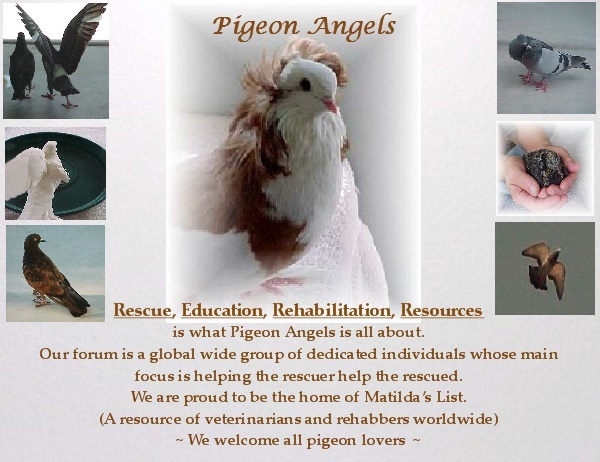N
Nystatin: An oral suspension used to treat candidiasis (yeast infection), medication must contact the organism, so used most often to treat oral or gastrointestinal candidiasis, some isolates of Candida are becoming resistant to nystatin, so it may be used as a carrier for fluconazole (a systemic antifungal agent), any baby bird on an antibiotic should also receive an antifungal agent to prevent secondary candidiasis
O Oxytocin: A drug for use in humans and mammals that causes uterine contractions and milk letdown, has been used by injection in cases of egg-binding, however, since birds are not mammals, this is not the best, most effective drug to use, but it may help a hen lay an egg in certain cases
PPenicillin G (procaine): The procaine in this injectable preparation used in small and large animals is very toxic in avian species and should not be used if safer antibiotics are available to treat the condition
Phenobarbital: An oral medication that can be used to try to control seizures in avian species, especially in cases of epilepsy
Piperacillin: Injectable antibiotic in the penicillin family, good broad-spectrum
Praziquantel: A dewormer that can be used to remove tapeworms and some flukes, can be administered orally or by injection
Prednisone, Prednisolone: Corticosteroids that are anti-inflammatory, immunosuppressive, may predispose birds to aspergillosis and other fungal infections, should be used only with extreme caution (either orally, topically or injectably)
Prostaglandin E2 (dinoprostone) gel: For use in cases of egg-binding, placed into cloaca, will help deliver an egg (if egg is not too large, there are not any complications, etc.)
Pyrantel Pamoate: An oral dewormer that is very safe and effective to remove intestinal roundworms, and other types of intestinal worms (except for tapeworms)
Pyrethrins: Topical preparation used to remove lice, mites, stick-tight fleas
Q Quinacrine: Oral medication rarely used to treat malaria (Plasmodium) in avian species
R Ronidazole: Oral antiprotozoal medication, very safe and efficacious for treating giardiasis in avian species (however, not produced for use in the U.S., but is available through companies in this country that import the medication for use in pigeons)
S Sevoflurane: Newer inhalation anesthetic, similar to isoflurane, provides more rapid recovery
Sulfachlorpyridazine: Powder antibiotic for susceptible bacterial infections of the gastrointestinal tract, also used to treat coccidiosis
Sulfadimethoxine: An oral and injectable medication used to treat coccidiosis (a type of protozoa)
T Tetracycline: An older antibiotic that is bacteriostatic, was used for treating Chlamydophila, Mycoplasma, spirochetes, rickettsiae, aerobic and anaerobic bacteria that are susceptible, also can be used to treat certain protozoal infections
Triamcinolone: A corticosteroid often found in topical preparations used for dogs and cats, can be dangerous when used topically in avian species, may predispose to aspergillosis and other fungal infections
Trimethoprim/Sulfamethoxazole (or sulfadizine): Oral, injectable bacteriocidal antibiotic combination, used for susceptible organisms
Tylosin: Older antibiotic, used in nebulization, also orally to treat susceptible bacterial infections, also can treat Mycoplasma and Chlamydophila, however not the recommended drug for those infections
UV Vecuronium Bromide: Can be used to dilate pupils in avian species
Vincristine Sulfate: Treatment for avian lymphosarcoma, possibly leukemia, given intravenously
Vinegar: Can be used in drinking water (apple cider) to treat gastrointestinal yeast infections, also can be applied topically to mucosa of cloaca (everted) to check for evidence of papillomas
WX Xylazine: Injectable agent used for sedation (seldom used in avian patients)
Y Yohimbine: Used to partially reverse xylazine
ZZinc: A metal that can cause weakness, depression, vomiting, diarrhea, increased thirst and urination, found in galvanized metal, some adhesives, some toys, pennies minted after 1982, and more, is associated with feather-picking in some birds, especially cockatoos, can be chelated
This is far from a complete list of medications used in birds, and is not meant to replace veterinary care. Never give your bird medication prescribed for another animal or human. If you have any question about your bird's health, please call your avian veterinarian or schedule an appointment for an examination and lab tests. This information is meant as a reference and guide to help you better understand a medication that was perhaps prescribed by your vet to treat your pet bird.
Copyright © 2006 Margaret A. Wissman, D.V.M., D.A.B.V.P.
All Rights Reserved
ExoticPetVet.net
www.exoticpetvet.net 

